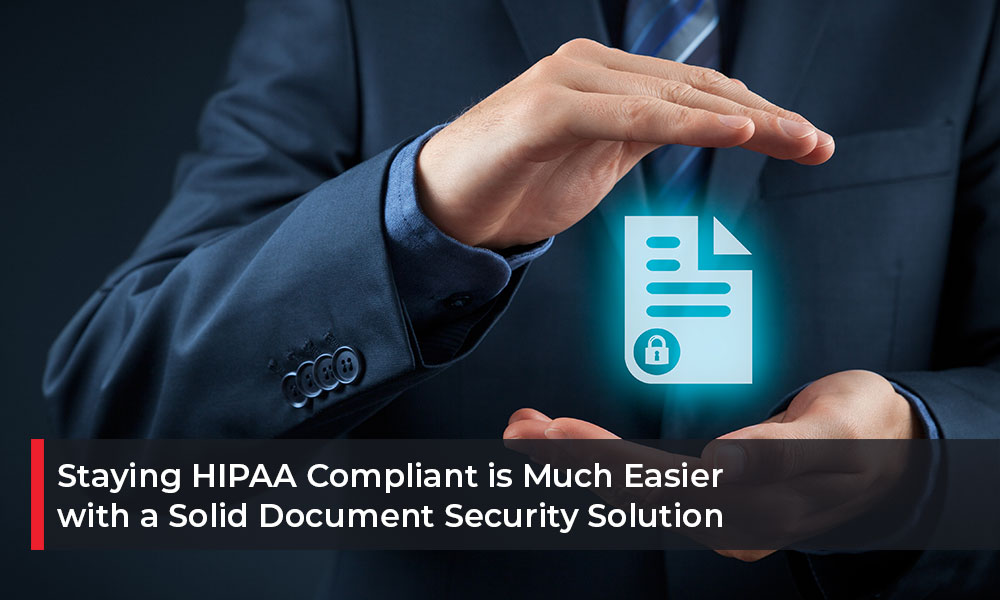For healthcare providers and their business associates, HIPAA compliance isn’t just a best practice. It’s a legal requirement. For these businesses, ensuring the security and confidentiality of protected health information (PHI) represents a non-negotiable aspect of business operations.
However, modern healthcare is awash in data, operating in a complex, dynamic environment. Keeping pace with changing regulations and security risks is challenging, time-consuming, and stressful.
Fortunately, document security solutions provide a convenient, comprehensive strategy for maintaining HIPAA compliance. From managing physical papers to electronic PHI access, managed solutions remove the guesswork involved in compliance.
More importantly, managed solutions address the risk that a business might forget a critical item. Read on to learn about what it takes to become HIPAA compliant, and how HIPAA compliance goes hand in hand with managed document solutions.
Becoming HIPAA Compliant in 2019
PHI includes any piece of medical information which contains identifiable patient information. HIPAA governs its storage, use, and transmission, as well as requirements in the event of a breach. Likewise, "covered entities" refer to any business or individual which handles PHI.
The US Department of Health and Human Services publishes the full law online. It also provides advice for HIPAA compliance and is worth reading.
HIPAA establishes four rules around which businesses should build their policies and procedures. Additionally, HIPAA requires the appointment of a Privacy Officer to oversee compliance. Companies establishing HIPAA compliance should use a checklist with the following items.
1. Security Rule
The HIPAA Security Rule governs PHI protection on physical, technical, and administrative levels. To satisfy the Security Rule, businesses should:
· Implement physical, electronic, and administrative access controls
· Introduce activity logs which document access attempts and tracks PHI use
· Develop policies which specify and restrict physical access to workstations
· Develop policies for the use and security of mobile devices
· Conduct risk assessments to identify possible ways breaches might occur
· Establish a risk management policy and contingency plan
· Create controls to restrict third-party access to PHI.
2. Privacy Rule
The HIPAA Privacy Rule sets the standards for how PHI can be used and disclosed. To become compliant under this rule, covered entities should:
· Provide employee training on all security policies
· Create a privacy policy regarding the disclosure of PHI
· Define a policy to get written permission from patients for PHI disclosure for research, marketing, or fundraising purposes
3. Breach Notification Rule
A breach is an accidental exposure or unauthorized disclosure of PHI. The HIPAA Breach Notification Rule requires patient notification when a breach occurs. HIPAA compliant notifications should:
· Occur no later than 60 days following the discovery of a breach
· Disclose the nature of the PHI involved, including what was exposed, who disclosed it and to whom it was exposed
· Explain the steps taken to reduce the risk of damage or further exposure
4. Omnibus Rule
The 2013 Omnibus Rule clarifies definitions and expands rules to account for new technology in the industry. Businesses which were HIPAA compliant before 2013 may need to:
· Update privacy policies, notices of privacy practices, and business associate agreements
· Train staff on the changes under the Omnibus Rule
· Issue new business associate agreements which reflect changes and updated definitions
How Managed IT and Document Solutions Providers Cuts Down on Security Risks
Technological changes in healthcare make managing IT and document security more challenging. Healthcare is already a complex and dynamic workspace. HIPAA introduces other elements which organizations must consider in their security.
Additionally, healthcare handles tremendous amounts of data and documents. Accidentally overlooking a critical aspect may result in costly fines or worse, a breach.
Document security solutions cut down on security risks because they streamline the protection and handling of sensitive data. In healthcare, these managed document solutions can cut down on security risks by:
· Introducing physical access controls to documents per HIPAA guidance
· Implementing secure faxing solutions
· Eliminating outsourced and potentially outdated forms
· Improving the management and flow of documents through digitization
· Covering devices ranging from PCs to mobile devices, printers, fax machines, and more
· Applying vetted and secure third-party support applications
Managed services take the stress out of compliance. Instead, they let providers focus on what they’re good at delivering high-quality care. Through customization, managed services introduce the right security measures in the right places.
Getting Started
HIPAA compliance doesn’t need to be complicated, and with managed document solutions, it isn’t. HIPAA is more than recommendations for the best practices. It’s a legal requirement which warrants careful consideration and a vested interested in doing things right.
DSI is a leading expert in document security solutions for healthcare organizations. A team of experts can work with HIPAA Privacy Officers to strengthen compliance with managed security solutions. The unique needs of each organization require a bespoke approach – there’s no one size fits all.
To find out more about how DSI can best serve your organization’s needs, reach out to a document security expert today.

